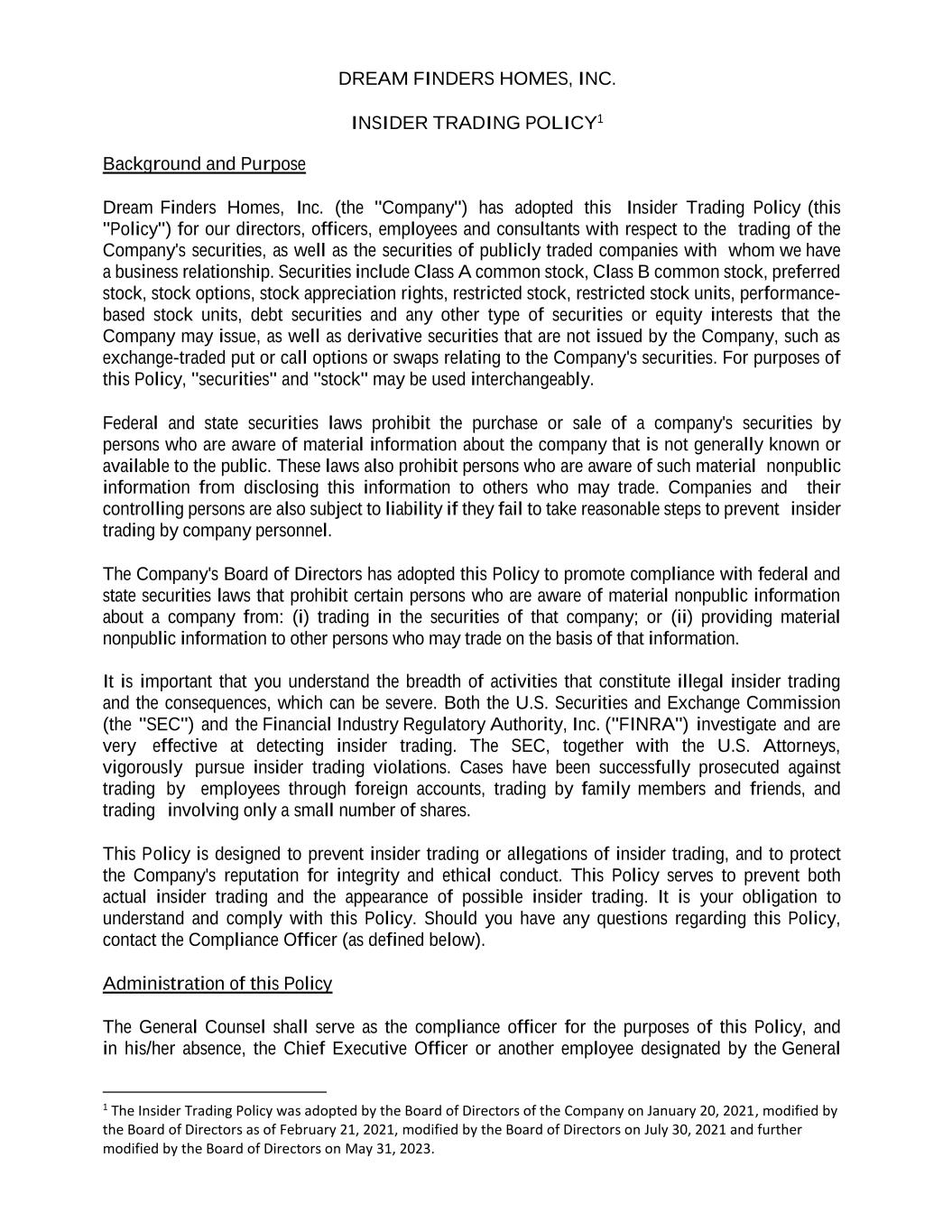
DREAM FINDERS HOMES, INC. INSIDER TRADING POLICY1 Background and Purpose Dream Finders Homes, Inc. (the "Company") has adopted this Insider Trading Policy (this "Policy") for our directors, officers, employees and consultants with respect to the trading of the Company's securities, as well as the securities of publicly traded companies with whom we have a business relationship. Securities include Class A common stock, Class B common stock, preferred stock, stock options, stock appreciation rights, restricted stock, restricted stock units, performance- based stock units, debt securities and any other type of securities or equity interests that the Company may issue, as well as derivative securities that are not issued by the Company, such as exchange-traded put or call options or swaps relating to the Company's securities. For purposes of this Policy, "securities" and "stock" may be used interchangeably. Federal and state securities laws prohibit the purchase or sale of a company's securities by persons who are aware of material information about the company that is not generally known or available to the public. These laws also prohibit persons who are aware of such material nonpublic information from disclosing this information to others who may trade. Companies and their controlling persons are also subject to liability if they fail to take reasonable steps to prevent insider trading by company personnel. The Company's Board of Directors has adopted this Policy to promote compliance with federal and state securities laws that prohibit certain persons who are aware of material nonpublic information about a company from: (i) trading in the securities of that company; or (ii) providing material nonpublic information to other persons who may trade on the basis of that information. It is important that you understand the breadth of activities that constitute illegal insider trading and the consequences, which can be severe. Both the U.S. Securities and Exchange Commission (the "SEC") and the Financial Industry Regulatory Authority, Inc. ("FINRA") investigate and are very effective at detecting insider trading. The SEC, together with the U.S. Attorneys, vigorously pursue insider trading violations. Cases have been successfully prosecuted against trading by employees through foreign accounts, trading by family members and friends, and trading involving only a small number of shares. This Policy is designed to prevent insider trading or allegations of insider trading, and to protect the Company's reputation for integrity and ethical conduct. This Policy serves to prevent both actual insider trading and the appearance of possible insider trading. It is your obligation to understand and comply with this Policy. Should you have any questions regarding this Policy, contact the Compliance Officer (as defined below). Administration of this Policy The General Counsel shall serve as the compliance officer for the purposes of this Policy, and in his/her absence, the Chief Executive Officer or another employee designated by the General 1 The Insider Trading Policy was adopted by the Board of Directors of the Company on January 20, 2021, modified by the Board of Directors as of February 21, 2021, modified by the Board of Directors on July 30, 2021 and further modified by the Board of Directors on May 31, 2023.
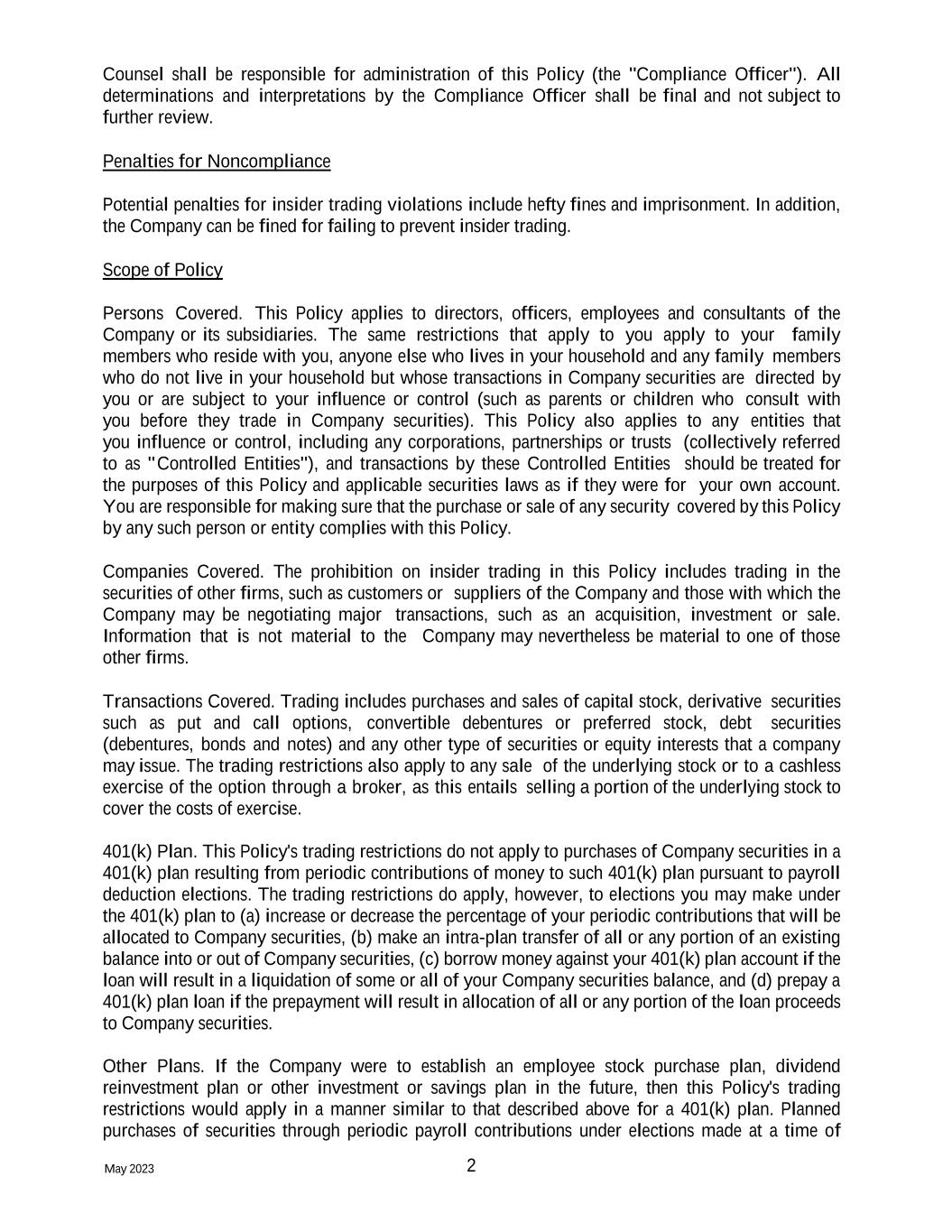
2 May 2023 Counsel shall be responsible for administration of this Policy (the "Compliance Officer"). All determinations and interpretations by the Compliance Officer shall be final and not subject to further review. Penalties for Noncompliance Potential penalties for insider trading violations include hefty fines and imprisonment. In addition, the Company can be fined for failing to prevent insider trading. Scope of Policy Persons Covered. This Policy applies to directors, officers, employees and consultants of the Company or its subsidiaries. The same restrictions that apply to you apply to your family members who reside with you, anyone else who lives in your household and any family members who do not live in your household but whose transactions in Company securities are directed by you or are subject to your influence or control (such as parents or children who consult with you before they trade in Company securities). This Policy also applies to any entities that you influence or control, including any corporations, partnerships or trusts (collectively referred to as "Controlled Entities"), and transactions by these Controlled Entities should be treated for the purposes of this Policy and applicable securities laws as if they were for your own account. You are responsible for making sure that the purchase or sale of any security covered by this Policy by any such person or entity complies with this Policy. Companies Covered. The prohibition on insider trading in this Policy includes trading in the securities of other firms, such as customers or suppliers of the Company and those with which the Company may be negotiating major transactions, such as an acquisition, investment or sale. Information that is not material to the Company may nevertheless be material to one of those other firms. Transactions Covered. Trading includes purchases and sales of capital stock, derivative securities such as put and call options, convertible debentures or preferred stock, debt securities (debentures, bonds and notes) and any other type of securities or equity interests that a company may issue. The trading restrictions also apply to any sale of the underlying stock or to a cashless exercise of the option through a broker, as this entails selling a portion of the underlying stock to cover the costs of exercise. 401(k) Plan. This Policy's trading restrictions do not apply to purchases of Company securities in a 401(k) plan resulting from periodic contributions of money to such 401(k) plan pursuant to payroll deduction elections. The trading restrictions do apply, however, to elections you may make under the 401(k) plan to (a) increase or decrease the percentage of your periodic contributions that will be allocated to Company securities, (b) make an intra-plan transfer of all or any portion of an existing balance into or out of Company securities, (c) borrow money against your 401(k) plan account if the loan will result in a liquidation of some or all of your Company securities balance, and (d) prepay a 401(k) plan loan if the prepayment will result in allocation of all or any portion of the loan proceeds to Company securities. Other Plans. If the Company were to establish an employee stock purchase plan, dividend reinvestment plan or other investment or savings plan in the future, then this Policy's trading restrictions would apply in a manner similar to that described above for a 401(k) plan. Planned purchases of securities through periodic payroll contributions under elections made at a time of
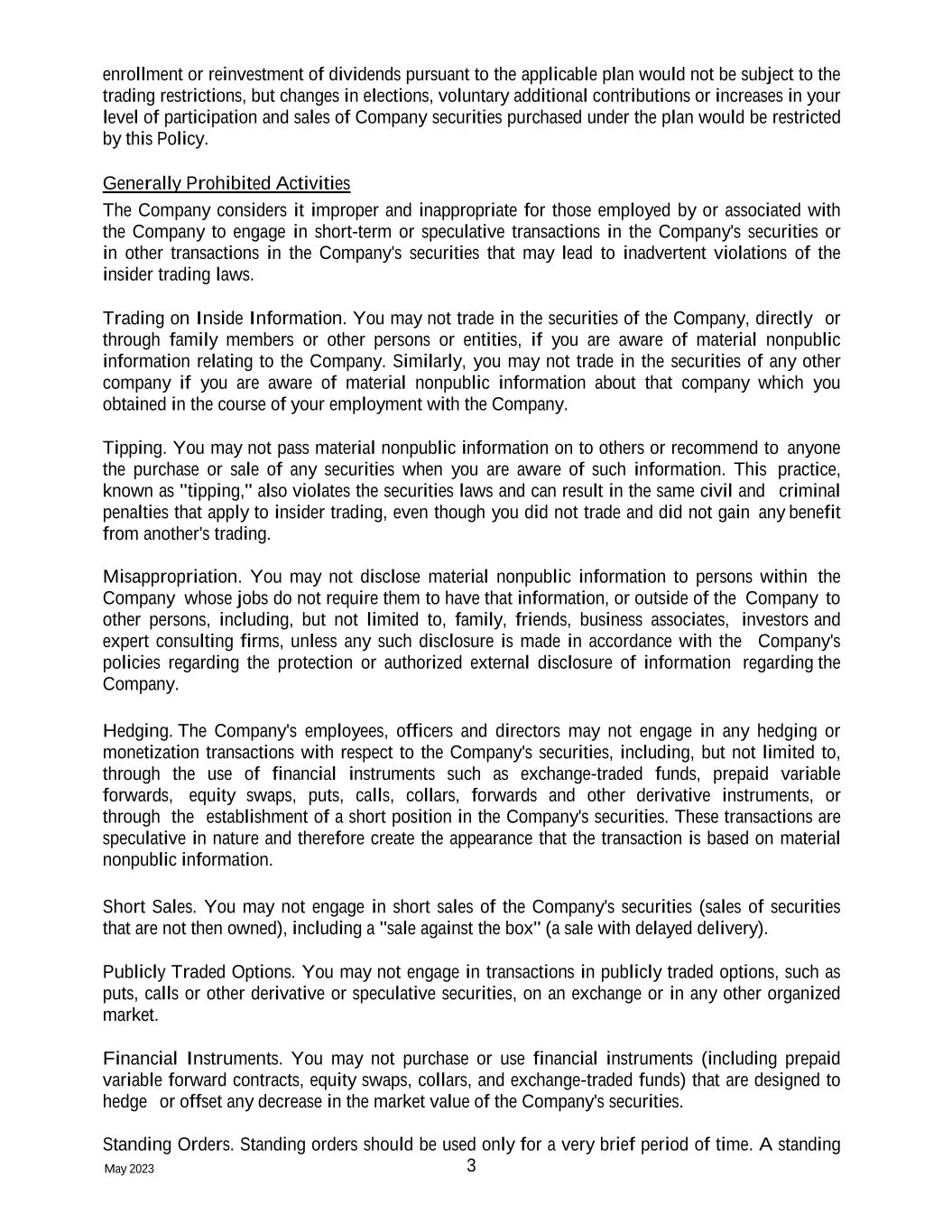
3 May 2023 enrollment or reinvestment of dividends pursuant to the applicable plan would not be subject to the trading restrictions, but changes in elections, voluntary additional contributions or increases in your level of participation and sales of Company securities purchased under the plan would be restricted by this Policy. Generally Prohibited Activities The Company considers it improper and inappropriate for those employed by or associated with the Company to engage in short-term or speculative transactions in the Company's securities or in other transactions in the Company's securities that may lead to inadvertent violations of the insider trading laws. Trading on Inside Information. You may not trade in the securities of the Company, directly or through family members or other persons or entities, if you are aware of material nonpublic information relating to the Company. Similarly, you may not trade in the securities of any other company if you are aware of material nonpublic information about that company which you obtained in the course of your employment with the Company. Tipping. You may not pass material nonpublic information on to others or recommend to anyone the purchase or sale of any securities when you are aware of such information. This practice, known as "tipping," also violates the securities laws and can result in the same civil and criminal penalties that apply to insider trading, even though you did not trade and did not gain any benefit from another's trading. Misappropriation. You may not disclose material nonpublic information to persons within the Company whose jobs do not require them to have that information, or outside of the Company to other persons, including, but not limited to, family, friends, business associates, investors and expert consulting firms, unless any such disclosure is made in accordance with the Company's policies regarding the protection or authorized external disclosure of information regarding the Company. Hedging. The Company's employees, officers and directors may not engage in any hedging or monetization transactions with respect to the Company's securities, including, but not limited to, through the use of financial instruments such as exchange-traded funds, prepaid variable forwards, equity swaps, puts, calls, collars, forwards and other derivative instruments, or through the establishment of a short position in the Company's securities. These transactions are speculative in nature and therefore create the appearance that the transaction is based on material nonpublic information. Short Sales. You may not engage in short sales of the Company's securities (sales of securities that are not then owned), including a "sale against the box" (a sale with delayed delivery). Publicly Traded Options. You may not engage in transactions in publicly traded options, such as puts, calls or other derivative or speculative securities, on an exchange or in any other organized market. Financial Instruments. You may not purchase or use financial instruments (including prepaid variable forward contracts, equity swaps, collars, and exchange-traded funds) that are designed to hedge or offset any decrease in the market value of the Company's securities. Standing Orders. Standing orders should be used only for a very brief period of time. A standing
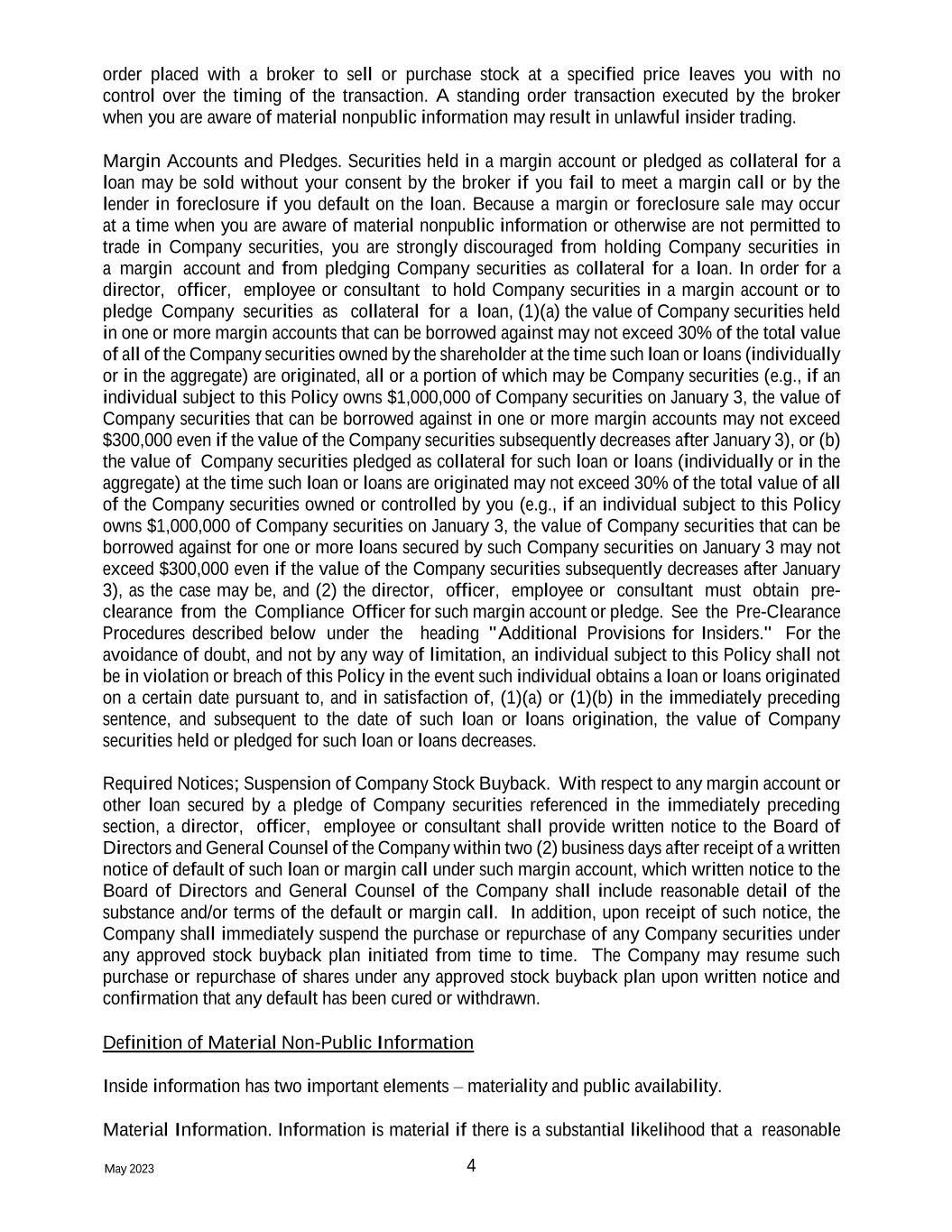
4 May 2023 order placed with a broker to sell or purchase stock at a specified price leaves you with no control over the timing of the transaction. A standing order transaction executed by the broker when you are aware of material nonpublic information may result in unlawful insider trading. Margin Accounts and Pledges. Securities held in a margin account or pledged as collateral for a loan may be sold without your consent by the broker if you fail to meet a margin call or by the lender in foreclosure if you default on the loan. Because a margin or foreclosure sale may occur at a time when you are aware of material nonpublic information or otherwise are not permitted to trade in Company securities, you are strongly discouraged from holding Company securities in a margin account and from pledging Company securities as collateral for a loan. In order for a director, officer, employee or consultant to hold Company securities in a margin account or to pledge Company securities as collateral for a loan, (1)(a) the value of Company securities held in one or more margin accounts that can be borrowed against may not exceed 30% of the total value of all of the Company securities owned by the shareholder at the time such loan or loans (individually or in the aggregate) are originated, all or a portion of which may be Company securities (e.g., if an individual subject to this Policy owns $1,000,000 of Company securities on January 3, the value of Company securities that can be borrowed against in one or more margin accounts may not exceed $300,000 even if the value of the Company securities subsequently decreases after January 3), or (b) the value of Company securities pledged as collateral for such loan or loans (individually or in the aggregate) at the time such loan or loans are originated may not exceed 30% of the total value of all of the Company securities owned or controlled by you (e.g., if an individual subject to this Policy owns $1,000,000 of Company securities on January 3, the value of Company securities that can be borrowed against for one or more loans secured by such Company securities on January 3 may not exceed $300,000 even if the value of the Company securities subsequently decreases after January 3), as the case may be, and (2) the director, officer, employee or consultant must obtain pre- clearance from the Compliance Officer for such margin account or pledge. See the Pre-Clearance Procedures described below under the heading "Additional Provisions for Insiders." For the avoidance of doubt, and not by any way of limitation, an individual subject to this Policy shall not be in violation or breach of this Policy in the event such individual obtains a loan or loans originated on a certain date pursuant to, and in satisfaction of, (1)(a) or (1)(b) in the immediately preceding sentence, and subsequent to the date of such loan or loans origination, the value of Company securities held or pledged for such loan or loans decreases. Required Notices; Suspension of Company Stock Buyback. With respect to any margin account or other loan secured by a pledge of Company securities referenced in the immediately preceding section, a director, officer, employee or consultant shall provide written notice to the Board of Directors and General Counsel of the Company within two (2) business days after receipt of a written notice of default of such loan or margin call under such margin account, which written notice to the Board of Directors and General Counsel of the Company shall include reasonable detail of the substance and/or terms of the default or margin call. In addition, upon receipt of such notice, the Company shall immediately suspend the purchase or repurchase of any Company securities under any approved stock buyback plan initiated from time to time. The Company may resume such purchase or repurchase of shares under any approved stock buyback plan upon written notice and confirmation that any default has been cured or withdrawn. Definition of Material Non-Public Information Inside information has two important elements – materiality and public availability. Material Information. Information is material if there is a substantial likelihood that a reasonable
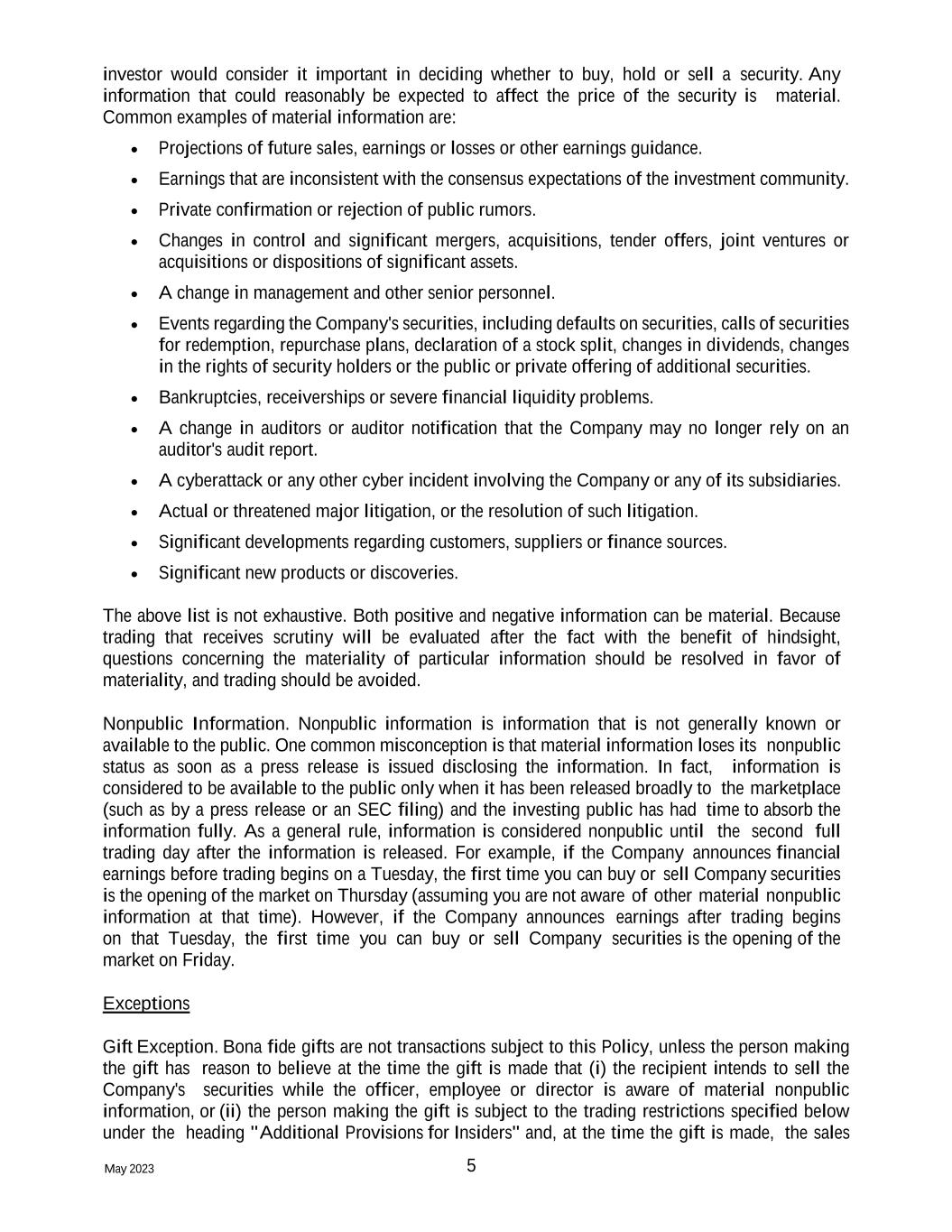
5 May 2023 investor would consider it important in deciding whether to buy, hold or sell a security. Any information that could reasonably be expected to affect the price of the security is material. Common examples of material information are: • Projections of future sales, earnings or losses or other earnings guidance. • Earnings that are inconsistent with the consensus expectations of the investment community. • Private confirmation or rejection of public rumors. • Changes in control and significant mergers, acquisitions, tender offers, joint ventures or acquisitions or dispositions of significant assets. • A change in management and other senior personnel. • Events regarding the Company's securities, including defaults on securities, calls of securities for redemption, repurchase plans, declaration of a stock split, changes in dividends, changes in the rights of security holders or the public or private offering of additional securities. • Bankruptcies, receiverships or severe financial liquidity problems. • A change in auditors or auditor notification that the Company may no longer rely on an auditor's audit report. • A cyberattack or any other cyber incident involving the Company or any of its subsidiaries. • Actual or threatened major litigation, or the resolution of such litigation. • Significant developments regarding customers, suppliers or finance sources. • Significant new products or discoveries. The above list is not exhaustive. Both positive and negative information can be material. Because trading that receives scrutiny will be evaluated after the fact with the benefit of hindsight, questions concerning the materiality of particular information should be resolved in favor of materiality, and trading should be avoided. Nonpublic Information. Nonpublic information is information that is not generally known or available to the public. One common misconception is that material information loses its nonpublic status as soon as a press release is issued disclosing the information. In fact, information is considered to be available to the public only when it has been released broadly to the marketplace (such as by a press release or an SEC filing) and the investing public has had time to absorb the information fully. As a general rule, information is considered nonpublic until the second full trading day after the information is released. For example, if the Company announces financial earnings before trading begins on a Tuesday, the first time you can buy or sell Company securities is the opening of the market on Thursday (assuming you are not aware of other material nonpublic information at that time). However, if the Company announces earnings after trading begins on that Tuesday, the first time you can buy or sell Company securities is the opening of the market on Friday. Exceptions Gift Exception. Bona fide gifts are not transactions subject to this Policy, unless the person making the gift has reason to believe at the time the gift is made that (i) the recipient intends to sell the Company's securities while the officer, employee or director is aware of material nonpublic information, or (ii) the person making the gift is subject to the trading restrictions specified below under the heading "Additional Provisions for Insiders" and, at the time the gift is made, the sales
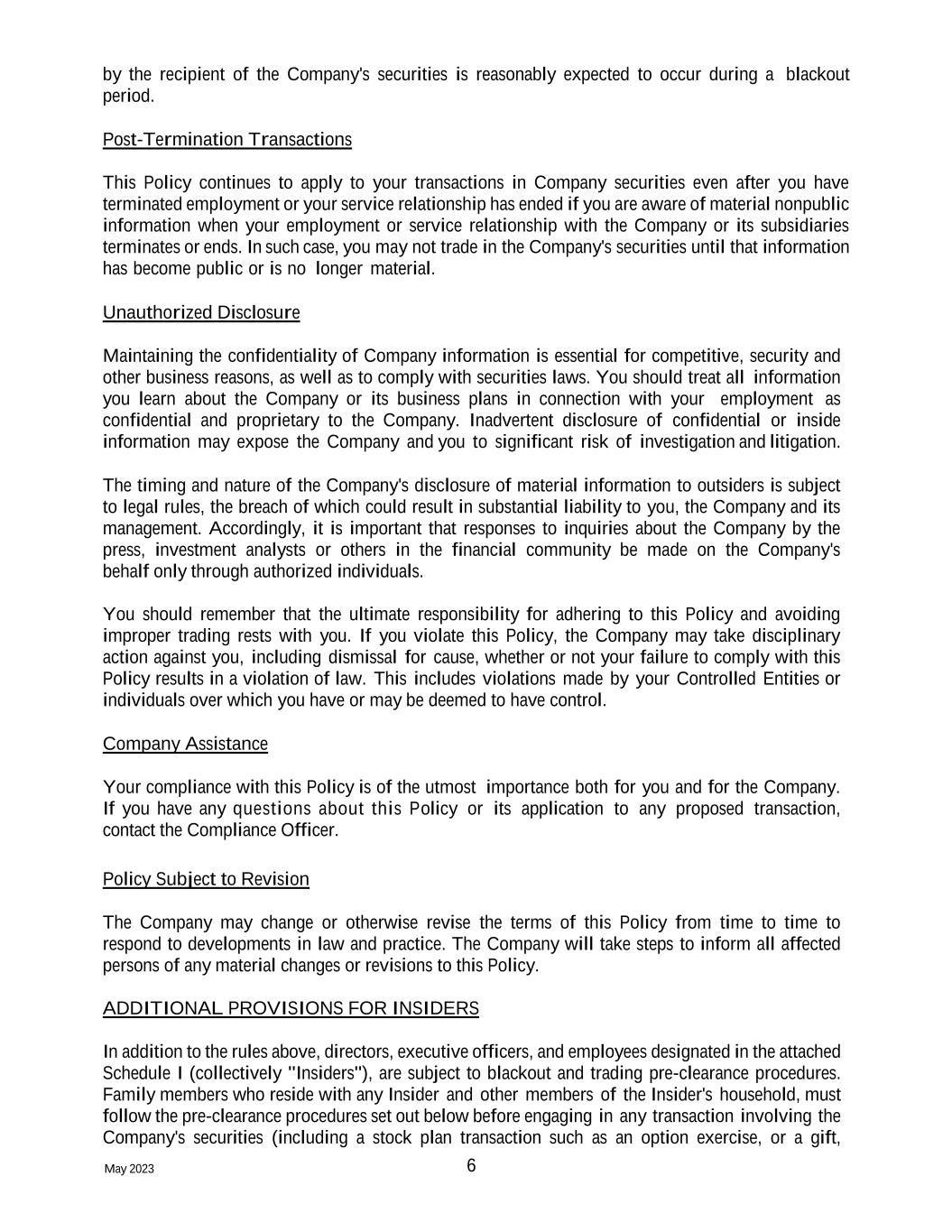
6 May 2023 by the recipient of the Company's securities is reasonably expected to occur during a blackout period. Post-Termination Transactions This Policy continues to apply to your transactions in Company securities even after you have terminated employment or your service relationship has ended if you are aware of material nonpublic information when your employment or service relationship with the Company or its subsidiaries terminates or ends. In such case, you may not trade in the Company's securities until that information has become public or is no longer material. Unauthorized Disclosure Maintaining the confidentiality of Company information is essential for competitive, security and other business reasons, as well as to comply with securities laws. You should treat all information you learn about the Company or its business plans in connection with your employment as confidential and proprietary to the Company. Inadvertent disclosure of confidential or inside information may expose the Company and you to significant risk of investigation and litigation. The timing and nature of the Company's disclosure of material information to outsiders is subject to legal rules, the breach of which could result in substantial liability to you, the Company and its management. Accordingly, it is important that responses to inquiries about the Company by the press, investment analysts or others in the financial community be made on the Company's behalf only through authorized individuals. You should remember that the ultimate responsibility for adhering to this Policy and avoiding improper trading rests with you. If you violate this Policy, the Company may take disciplinary action against you, including dismissal for cause, whether or not your failure to comply with this Policy results in a violation of law. This includes violations made by your Controlled Entities or individuals over which you have or may be deemed to have control. Company Assistance Your compliance with this Policy is of the utmost importance both for you and for the Company. If you have any questions about this Policy or its application to any proposed transaction, contact the Compliance Officer. Policy Subject to Revision The Company may change or otherwise revise the terms of this Policy from time to time to respond to developments in law and practice. The Company will take steps to inform all affected persons of any material changes or revisions to this Policy. ADDITIONAL PROVISIONS FOR INSIDERS In addition to the rules above, directors, executive officers, and employees designated in the attached Schedule I (collectively "Insiders"), are subject to blackout and trading pre-clearance procedures. Family members who reside with any Insider and other members of the Insider's household, must follow the pre-clearance procedures set out below before engaging in any transaction involving the Company's securities (including a stock plan transaction such as an option exercise, or a gift,
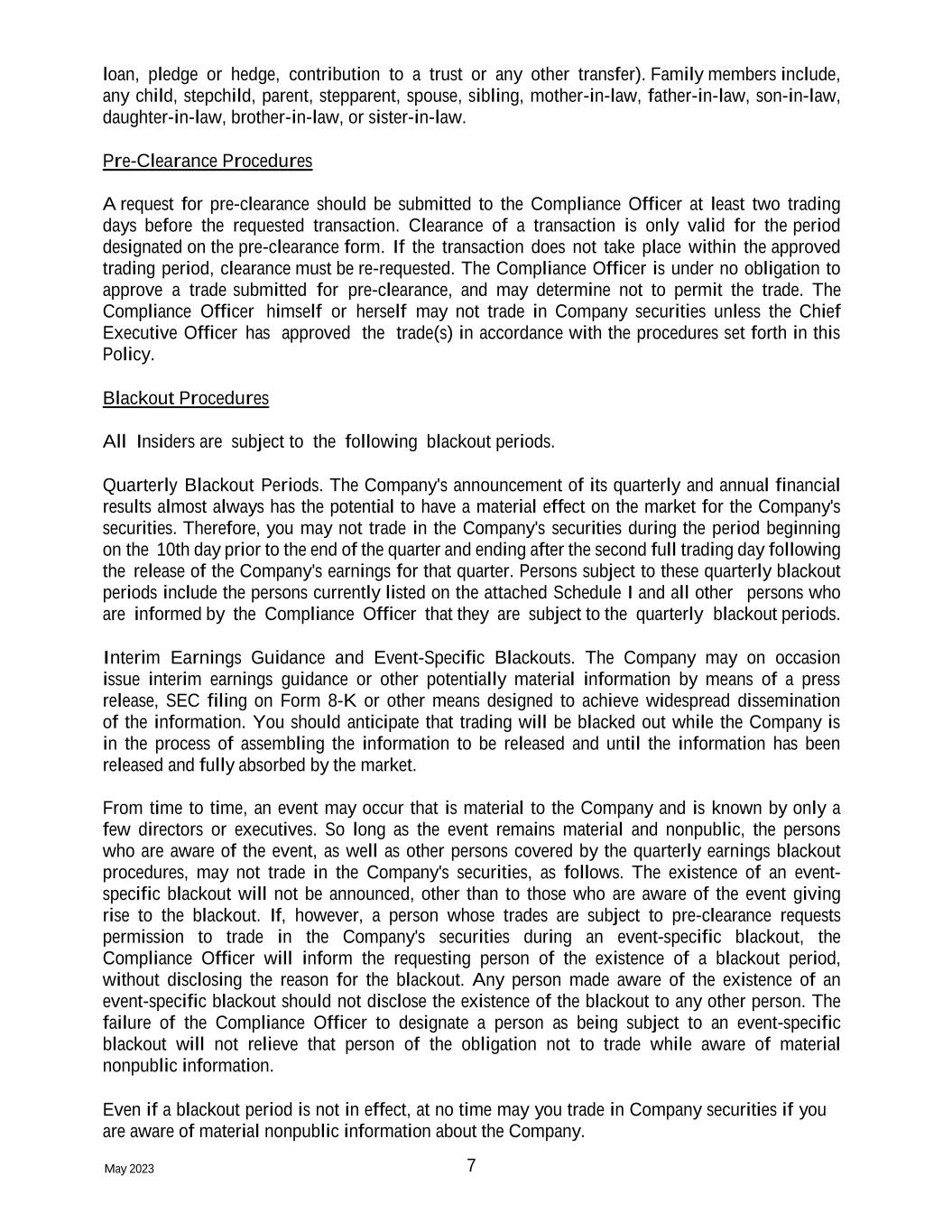
7 May 2023 loan, pledge or hedge, contribution to a trust or any other transfer). Family members include, any child, stepchild, parent, stepparent, spouse, sibling, mother-in-law, father-in-law, son-in-law, daughter-in-law, brother-in-law, or sister-in-law. Pre-Clearance Procedures A request for pre-clearance should be submitted to the Compliance Officer at least two trading days before the requested transaction. Clearance of a transaction is only valid for the period designated on the pre-clearance form. If the transaction does not take place within the approved trading period, clearance must be re-requested. The Compliance Officer is under no obligation to approve a trade submitted for pre-clearance, and may determine not to permit the trade. The Compliance Officer himself or herself may not trade in Company securities unless the Chief Executive Officer has approved the trade(s) in accordance with the procedures set forth in this Policy. Blackout Procedures All Insiders are subject to the following blackout periods. Quarterly Blackout Periods. The Company's announcement of its quarterly and annual financial results almost always has the potential to have a material effect on the market for the Company's securities. Therefore, you may not trade in the Company's securities during the period beginning on the 10th day prior to the end of the quarter and ending after the second full trading day following the release of the Company's earnings for that quarter. Persons subject to these quarterly blackout periods include the persons currently listed on the attached Schedule I and all other persons who are informed by the Compliance Officer that they are subject to the quarterly blackout periods. Interim Earnings Guidance and Event-Specific Blackouts. The Company may on occasion issue interim earnings guidance or other potentially material information by means of a press release, SEC filing on Form 8-K or other means designed to achieve widespread dissemination of the information. You should anticipate that trading will be blacked out while the Company is in the process of assembling the information to be released and until the information has been released and fully absorbed by the market. From time to time, an event may occur that is material to the Company and is known by only a few directors or executives. So long as the event remains material and nonpublic, the persons who are aware of the event, as well as other persons covered by the quarterly earnings blackout procedures, may not trade in the Company's securities, as follows. The existence of an event- specific blackout will not be announced, other than to those who are aware of the event giving rise to the blackout. If, however, a person whose trades are subject to pre-clearance requests permission to trade in the Company's securities during an event-specific blackout, the Compliance Officer will inform the requesting person of the existence of a blackout period, without disclosing the reason for the blackout. Any person made aware of the existence of an event-specific blackout should not disclose the existence of the blackout to any other person. The failure of the Compliance Officer to designate a person as being subject to an event-specific blackout will not relieve that person of the obligation not to trade while aware of material nonpublic information. Even if a blackout period is not in effect, at no time may you trade in Company securities if you are aware of material nonpublic information about the Company.
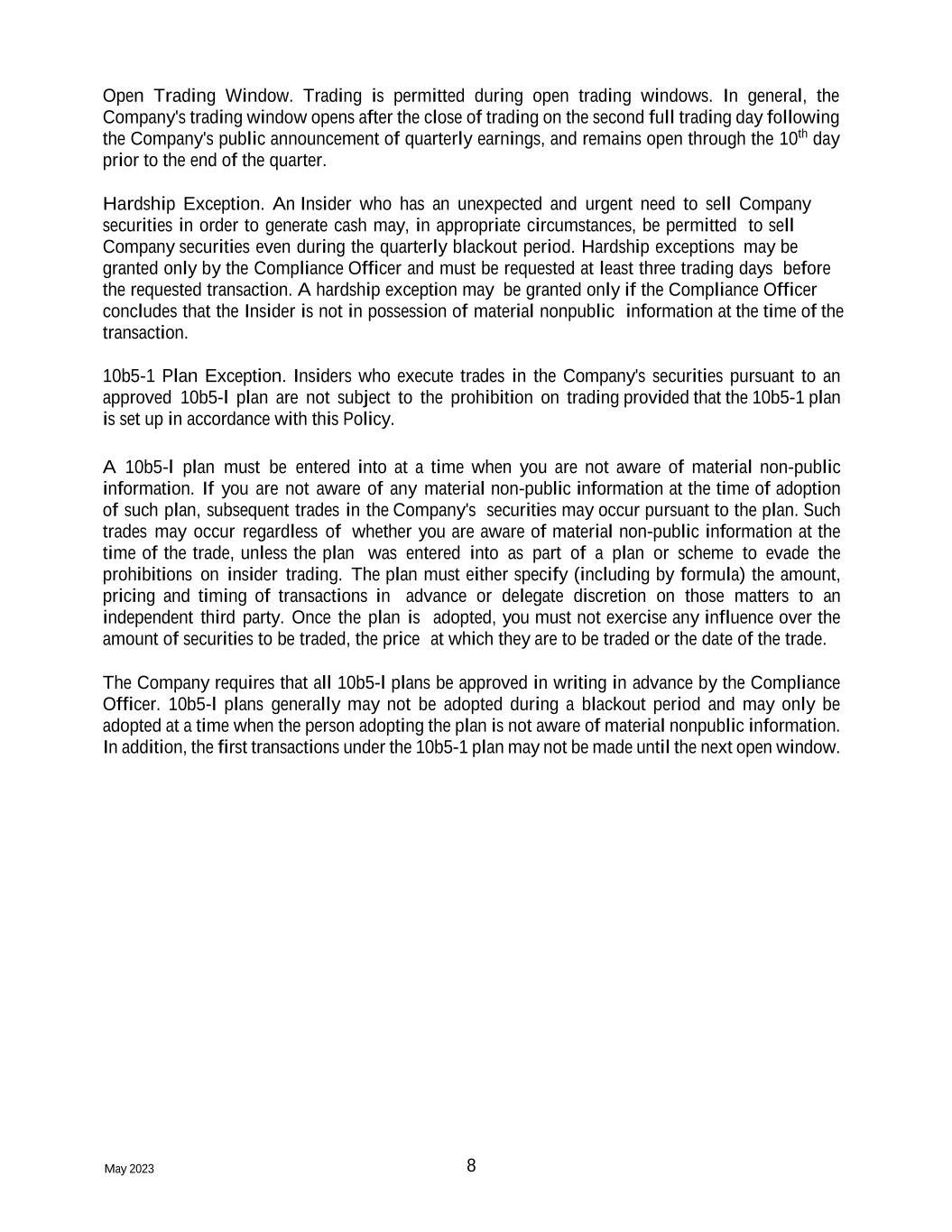
8 May 2023 Open Trading Window. Trading is permitted during open trading windows. In general, the Company's trading window opens after the close of trading on the second full trading day following the Company's public announcement of quarterly earnings, and remains open through the 10th day prior to the end of the quarter. Hardship Exception. An Insider who has an unexpected and urgent need to sell Company securities in order to generate cash may, in appropriate circumstances, be permitted to sell Company securities even during the quarterly blackout period. Hardship exceptions may be granted only by the Compliance Officer and must be requested at least three trading days before the requested transaction. A hardship exception may be granted only if the Compliance Officer concludes that the Insider is not in possession of material nonpublic information at the time of the transaction. 10b5-1 Plan Exception. Insiders who execute trades in the Company's securities pursuant to an approved 10b5-l plan are not subject to the prohibition on trading provided that the 10b5-1 plan is set up in accordance with this Policy. A 10b5-l plan must be entered into at a time when you are not aware of material non-public information. If you are not aware of any material non-public information at the time of adoption of such plan, subsequent trades in the Company's securities may occur pursuant to the plan. Such trades may occur regardless of whether you are aware of material non-public information at the time of the trade, unless the plan was entered into as part of a plan or scheme to evade the prohibitions on insider trading. The plan must either specify (including by formula) the amount, pricing and timing of transactions in advance or delegate discretion on those matters to an independent third party. Once the plan is adopted, you must not exercise any influence over the amount of securities to be traded, the price at which they are to be traded or the date of the trade. The Company requires that all 10b5-l plans be approved in writing in advance by the Compliance Officer. 10b5-l plans generally may not be adopted during a blackout period and may only be adopted at a time when the person adopting the plan is not aware of material nonpublic information. In addition, the first transactions under the 10b5-1 plan may not be made until the next open window.
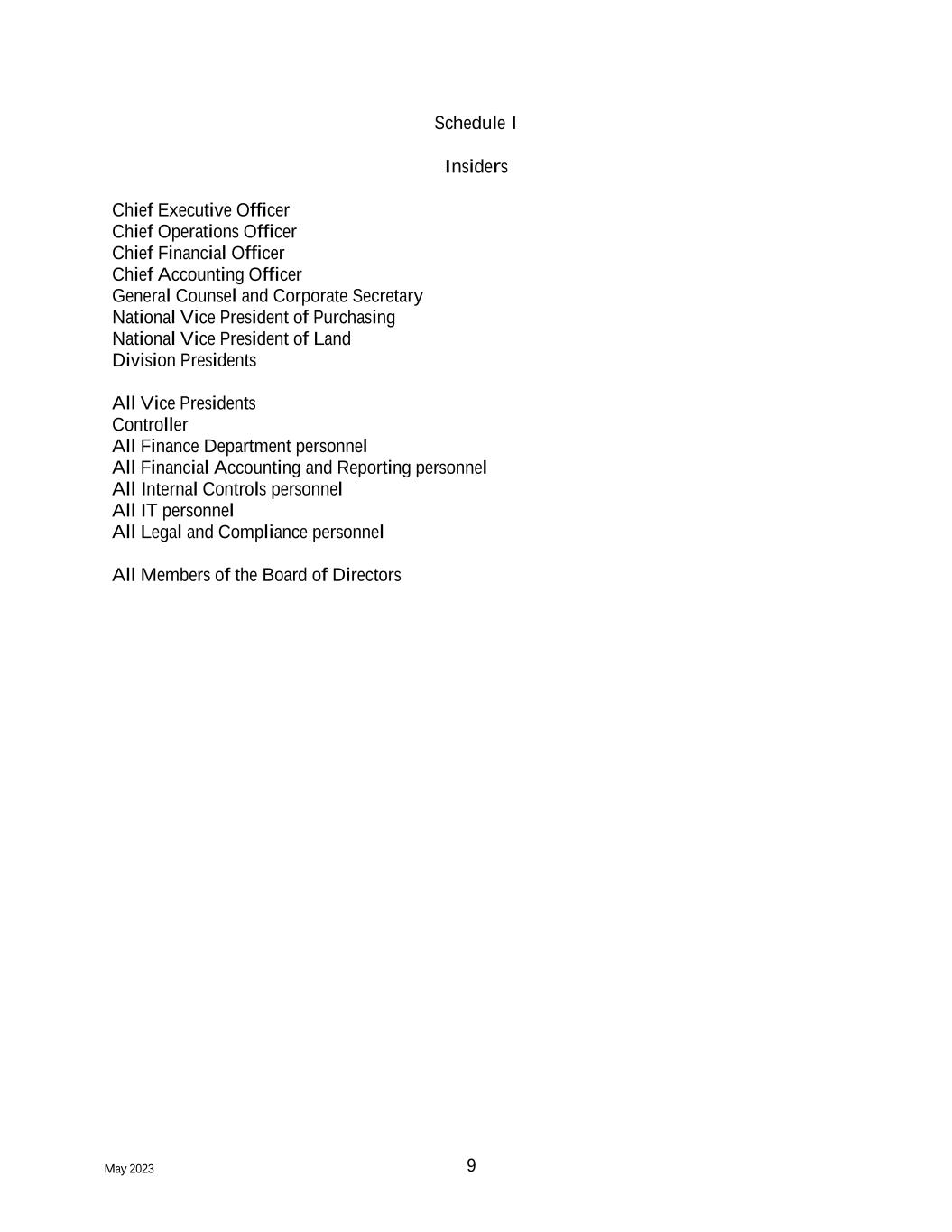
9 May 2023 Schedule I Insiders Chief Executive Officer Chief Operations Officer Chief Financial Officer Chief Accounting Officer General Counsel and Corporate Secretary National Vice President of Purchasing National Vice President of Land Division Presidents All Vice Presidents Controller All Finance Department personnel All Financial Accounting and Reporting personnel All Internal Controls personnel All IT personnel All Legal and Compliance personnel All Members of the Board of Directors